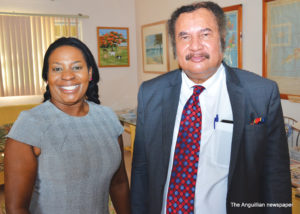
Over the past years Anguilla benefitted from the services of Mr. Kurt De Freitas as Attorney General, and now he is again working with the island as a short-term health consultant as part of a regional engagement.
The Guyana-born national, who lives in Manchester, told The Anguillian newspaper about his previous and current engagements.
“I came to Anguilla in 1987 and left in 1997 after serving as Attorney General. When I left here I went to St. Helena which basically comprises three islands: St Helena, Ascension Island and Tristan da Cunha. I was based in St. Helena, but as Attorney General I also had responsibility for the other two islands as well. I spent about six years there.”
Known for his sense of humour and laughter, he said: “My stay there was actually longer than that of Napoleon because I think he died after five years or something like that. Whatever is the number, I think I outlasted Napoleon. I don’t know why I should be saying something like that because St. Helena is a nice island. I hope my comment is not viewed in a derogatory manner to indicate that something is wrong with St. Helena but, as you know, it was where he was sent in exile – and where he died.”
Mr. De Freitas continued: “From St. Helena I went to the Cayman Islands where I stayed for just under a year, and then to the Turks and Caicos Islands where I spent about six years.
“I am now doing a consultancy for the Commonwealth Secretariat. I was engaged as a consultant attached to CARICOM to assist member states with legislation to meet the requirements of the WHO Convention on Tobacco Control – to satisfy various aspects of the Convention. I live in Manchester in the United Kingdom normally, but for this assignment, which is for a year, I am based at the CARICOM Secretariat in Georgetown, Guyana.
“I have been in Anguilla in the capable hands of the Director of the National Disease Control Unit [Mrs. Twyla Bradshaw-Richardson]. We have had a series of consultations on a programme drawn up by the Ministry of Health. I think there have been very positive consultations which went very well. I will now go away and begin to draft the legislation.”
Asked how the consultations were of benefit to her and the Ministry, the senior health official replied: “Actually, the consultations were very insightful. We focused on those persons in Anguilla whom we thought that the Bill will impact the most; heard their views and looked at what considerations we can make in terms of drafting the Bill be to put forward; and we heard about how the Bill may affect their businesses. It was helpful hearing their views and having Mr. De Freitas with such robust knowledge on the Convention that guides these actions. We were able to find a way forward with key stakeholders, and I believe that we should not have much objection to tobacco control.”
Mr. De Freitas stated, however, that it might not be possible to have full control over the use of tobacco – but of at least certain aspects of its usage. “It is not to say that tobacco is to be made illegal to use, and therefore it should be completely banned and persons cannot use it,” he observed. “It is recognised that tobacco is still going to be used, but it needs to be used in a cautious way – particularly from the standpoint of the effects of second hand smoking.
“A person may well determine that he or she is a smoker and is willing to take the risk to themselves, but then the smoke goes to someone else who has taken the choice not to use tobacco or tobacco products. However, their health may be affected by second hand smoke and they become ill. It is a burden on health services because there is scientific evidence that there is a good basis from the World Health Organisation which shows that there is a link between tobacco use and various non-communicable diseases.”
The consultant, Mr. De Freitas, added: “The idea behind the Convention is to try to reduce the use of tobacco, and therefore reduce the number of cases of illnesses associated with its use.”








